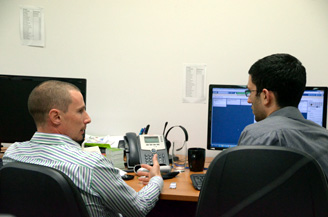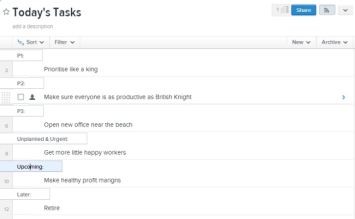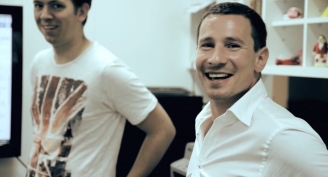
After spending two years as an executive in a fast growing Online Marketing agency with several offices across the globe, a large number of to-dos can accumulate in any given day. I go through a lot of delegation, continuous prioritising exercises, and seamless decision making while trying to keep my composure and sanity on daily basis.

So to retain a profitable operation without borrowing millions from the bank or getting VC, I had to adapt to a variety of roles and prioritise between them amongst major planning and high level decisions that are expected of me.
I will try to summarise how I think you should deal with all of that ‘background noise’, tedious tasks and interruptions and how to find balance in all of these factors in order to achieve optimum results.
Look at the big picture
In a typical day, you might be dealing with: prospected clients, campaigns, people, data, meeting agendas and a whole lot in between. Now, let’s add to this some interruptions and a steady flow of 25 emails every 4 hours that need to be processed to Inbox-zero.
So how do you manage to make it through a day like this?
There is no magic system that fits everyone, but you should find one that works for you. One example that I find useful is to use a spreadsheet to prioritise the backlog of tasks.

You must make time to step away from the noise. Make sure that you spend time looking at what’s really crucial to achieve the dream. Find a way to re-focus on the goal that you’ve set and that everyone else on your team should be striving towards.
Make it a game!
Before I came on board to help run the agency, I worked in the video games industry. As much fun making games was, it also taught me how important for us humans is to treat work as a game. One tool that is good to get through your tasks in a simple but fun way is Asana. You’ll need to create simple headings that match your scheduling methodology.

It feels good when you tick a task as complete. It feels good when you get three things done during your 25-minute allocated timeframe. It feels great when you clear your inbox.
So, find what feels good for you and make it a part of your daily routine. This game should include an accomplishment which in turn rewards you. Prize makes you feel better but it also makes you more productive.
Finding the balance is the key
If you find yourself having too much fun moving things around, fiddling with little tasks, options, stars, timers or whatever it is that you use to track your progress – you’ve gone to the other side. You’ve now become less productive by wasting precious time playing around with unproductive buttons. So make it a quick and productive game.
You can use Pomodoro Technique to time yourself for 25 minutes before you are allowed to take a break. If you get interrupted, either by external party or your own ‘creative’ thought, don’t let it break your focus. Add this thought or an interruption as a new task in a separate section, called “Unplanned & Urgent”, so that you can deal with it after you’ve finished with your current point of focus.
The anxiety of the email awaits
The email gets in the middle of all this, breaking your beautiful routine, your giant hairy goal. What do you do with all the emails that keep coming in?
Use the simplest email archiving system with very few folders. Align your email checking periods with the logical break so that it’s not in the middle of your productive time. Don’t use inbox as a task-list, use it as mean of communication.
Email is meant to be a great communication tool, a replacement for writing a letter or a “memo”. Chances are that you don’t even know what a memo is if you were born post-seventies. Email is not good for resolving a complex back-and-forth discussion. A meeting, concise, pre-determined get-together is a much better solution.
Email is good in those instances when you need to convey specific items such as those following:
- Agendas
- Meeting minutes
- Attachments
- A clear way of communication that prompts for simple, focused answer (‘Can you get me that report’, or ‘Do you want to have lunch this Friday?’).
There are a lot of resources and methodologies about email, but here are my top ones. I may have OCD (obsessive compulsive disorder), but I swear by Inbox Zero. Once you look into four sentences methodology, you quickly realise how you’ve been over-doing your emails.

Before moving to Google Apps, I used Follow up then and it worked. But when you combine the functionality of logical time-boxing (3 hours, tomorrow, 3 days, next week, next month) with Gmail starred messages system, it changes everything!
How to find your inner genius
There are some people that are just pure genius. They are the kind of people that whatever they touch turns to gold. They have both of their sides of brain working, they’re creative and at the same time focused on doing technical wizardry that’s beyond a normal person. I’ve met some of those people in the video game industry; I’ve met some in the online marketing industry and I’m always fascinated by them.
I’m not a genius. I’ve accepted this. But what I can do is – put plan into action and get things done. I do it because I like to do it, because I made it my passion, my favourite job and lifelong challenge to do just this– make things happen.

What do you think?
Please let us know your thoughts by commenting on Google+.
Dan Petrovic, the managing director of DEJAN, is Australia’s best-known name in the field of search engine optimisation. Dan is a web author, innovator and a highly regarded search industry event speaker.
ORCID iD: https://orcid.org/0000-0002-6886-3211
